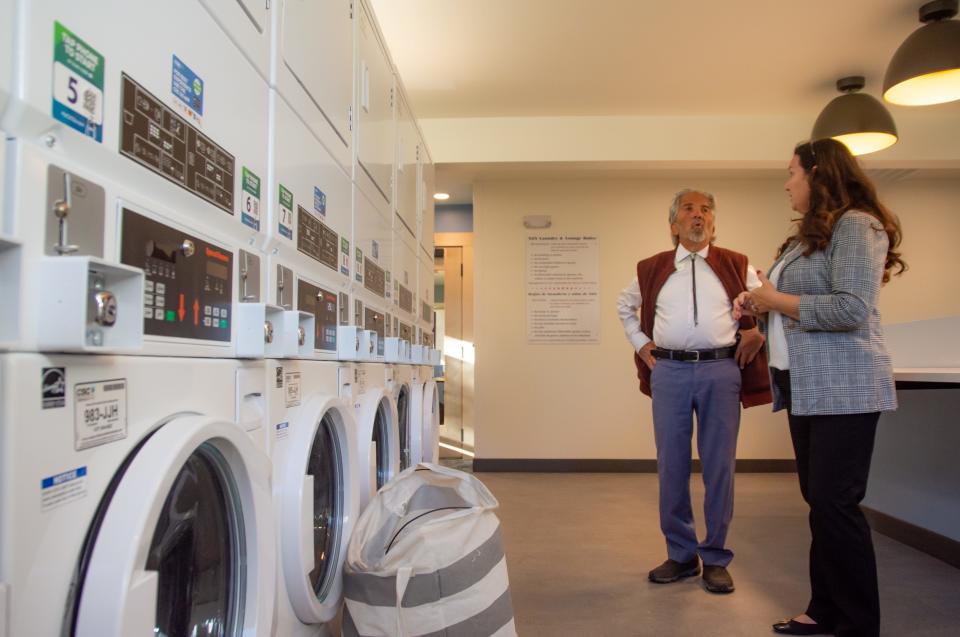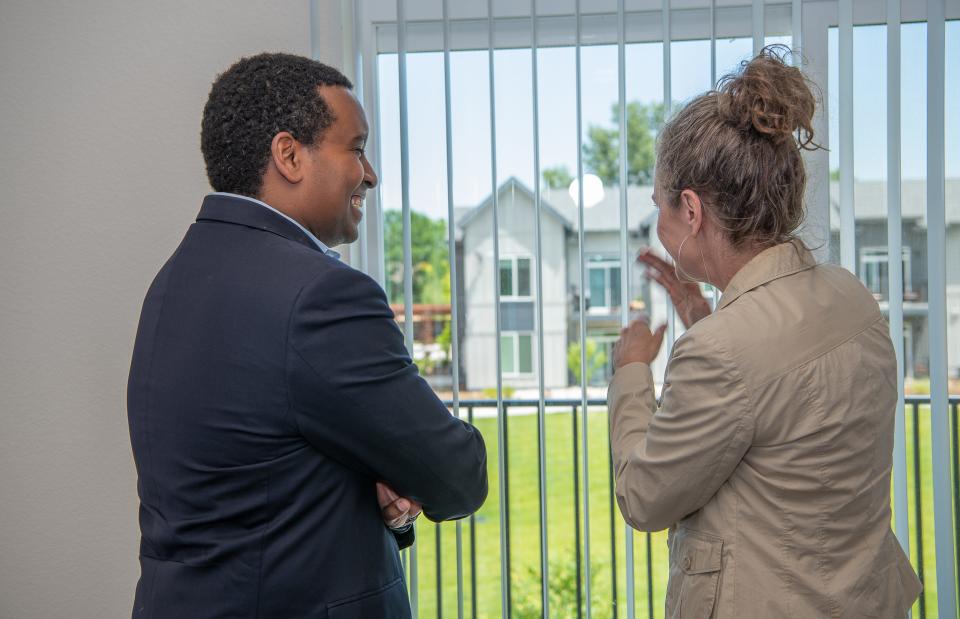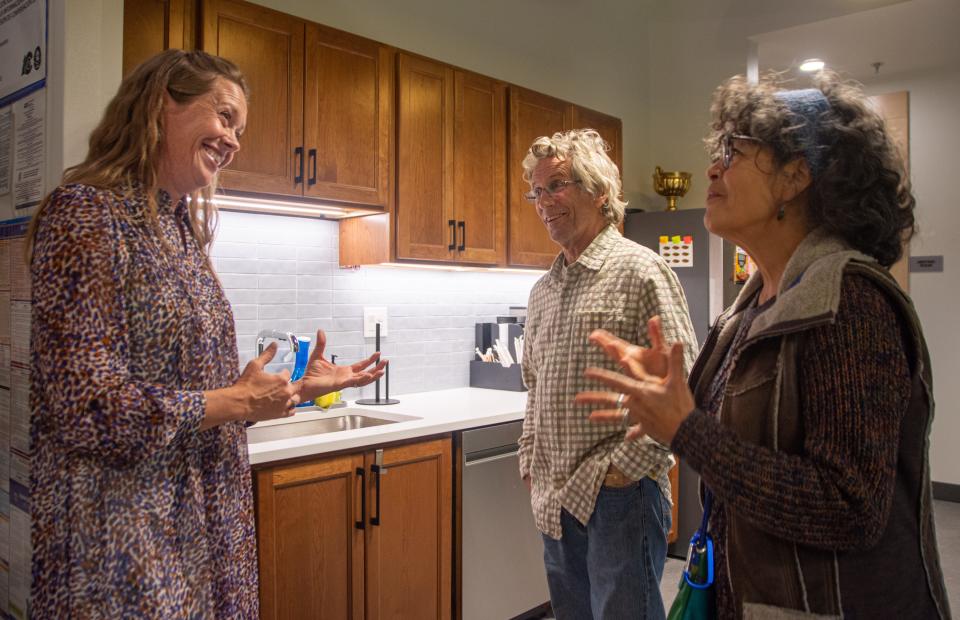A voter's guide to the proposed Fort Collins property tax to fund affordable housing
Fort Collins Ballot Issue 2B asks voters to approve a new 3-mill property tax to fund affordable housing.
That 19-word sentence might be raising a lot of questions for you already. For some, it's raising eyebrows. And for others, it's raising hopes.
So, how did this proposal come about and what does it hope to do?
Fort Collins has a goal of making 10% of the city's housing stock affordable. The city defines this as: housing that is affordable for households making 80% or less of the area median income, meaning they are spending no more than 30% of their income on rent or 38% of their income on a mortgage.
The 2022 area median income in Fort Collins was $75,200 for a single person and $107,300 for a family of four. A single person making 80% earns $60,160, and a family of four earns $85,840.
That means a single person earning $60,160 should not spend more than $1,504 on monthly rent or $1,905 on a mortgage payment, and a family of four bringing in $85,840 should not spend more than $2,146 on rent or more than $2,718 on a mortgage.
To help it achieve its goal, Fort Collins has developed a Housing Strategic Plan that outlines strategies so "everyone has healthy, stable housing they can afford.”
But to implement those strategies, city staff says it needs at least $8 million more annually. After months of discussion on this and other gaps affecting parks and recreation, transit and climate goals, City Council referred this property tax to the ballot.
Read on for analysis, explanations and pros/cons to help you make your decision when ballots are sent out during the week of Oct. 16.
What would the property tax fund?
The ballot language doesn't link the additional tax revenue to any specific project but ties it to the city's affordable housing strategies.
The money, according to the ballot language, is "for the exclusive purpose of funding 'affordable housing', as defined by City Council, to include funding the affordable housing strategies identified in the city’s 2021 housing strategic plan, as later amended or replaced by City Council, and to fund:
The city’s development, construction, acquisition, operation, and maintenance of affordable housing;
Grants and incentives for the development, construction, acquisition, operation, and maintenance of affordable housing by private and other public entities; and
Programs and services provided by the city, other public entities, and nonprofit organizations to subsidize affordable housing and provide housing support for it."
The Housing Strategic Plan lists seven goals and 26 strategies for achieving them. Here are some goals and strategies listed in the plan that pertain to affordable housing:
Increase housing supply and affordability: Examples include removing barriers to accessory dwelling units, updating the city’s Land Use Code and creating a new dedicated revenue stream.
Increase housing diversity and choice: Examples include recalibrating existing incentives, exploring innovative housing development opportunities and removing barriers to allowed densities via the Land Use Code.
Improve housing equity: Examples include promoting inclusion and affordability as community values, supporting foreclosure and eviction prevention, and assessing displacement risk.
Preserve existing affordable housing: Examples include extending the required affordability term for new developments, and right of first offer/refusal for public and tenants when affordable housing developments go up for sale.
You can find the city's Housing Strategic Plan here.
How does the city currently fund affordable housing initiatives?
Before we get into what the new tax could fund, it's helpful to know what the city's affordable housing work looks like now.
The city's current funding for affordable housing initiatives is about $1.3 million annually, with an additional $1.3 million from state and federal government agencies, city Chief Financial Officer Travis Storin said.
For comparison, the new property tax could bring in as much as $16 million in the first year and could rise in subsequent years.
So, what does the city spend that more than $3 million on?
"The city doesn't build homes, but we do through a competitive process to provide funding to nonprofits and housing agencies that build and renovate and help with homeowner assistance," said Ginny Sawyer, project and policy manager for the city.
"What we can do is develop incentive programs, help to offset fees, and also do our own land banking program," she said.
The city's current funding for affordable housing initiatives is determined through its regular budgeting process, said Meaghan Overton, the city's housing manager.
Developers and nonprofits can apply for grants offered through the city, much of which is funded with federal money. The city's Human Services and Housing Funding Board and Affordable Housing Board evaluate and make funding recommendations to City Council, whose members then decide on budget requests.
The city also has a land bank.
The land bank is Fort Collins' “only long-term affordable housing tool,” according to its website.
The land bank acquires sites that lack infrastructure — and therefore have a lower price — and hangs onto them until new nearby development projects help fill in that infrastructure, making it less expensive to develop into affordable housing.
The city has bought six sites for the land bank. Two properties have been sold for development as affordable housing.
So, what affordable housing initiatives could 2B fund?
It could fund more of what the city is already doing, through grants and incentives to developers and nonprofits who are building affordable housing, and also through the land bank.
The goal is to address the biggest needs first, Overton said, which are projects that are hardest to build and finance. In Fort Collins, that's rental units for people making less than 60% of AMI or ownership units for people making 100% or less of AMI.
It's not that the city wouldn't spend money on other projects, she said, but it will be dependent on what's being proposed in the market. "It's hard to project into the future what kinds of projects" will be proposed and seek funding.
The money could support projects for permanent supportive housing for individuals at risk of homelessness and on-site wraparound services that would be part of such a project, like health care services.
Overton anticipates the demand for funding would exceed the supply, so the city would need a program and a process to administer it.

What would the tax not fund?
When council referred the issue to the ballot, it chose language that referred specifically to "affordable housing" rather than the broader Housing Strategic Plan, which also covers strategies related to market-rate housing.
Examples of things that live outside the affordable housing umbrella are: Americans with Disability Act upgrades, programs to address home habitability, or a future rental licensing program.

What would happen if this tax fails?
While the city has identified an $8 million or more funding gap to meet the goals outlined in the Housing Strategic Plan, not funding these initiatives doesn't cut any current programs. It doesn't threaten federal funds or local funds that have already been set aside, Overton said.
"It just means it will take longer to implement those goals and visions," Sawyer said.
Why is the city pursuing a property tax increase for affordable housing?
Numerous residents have pointed out that increasing taxes on existing housing in the city in order to fund affordability programs seems like a contradiction. City Council discussion provides some insight on how the city landed here:
Initially, the city and council were planning to fund affordable housing with the sales tax and lump it together with transit and climate.
But during the July 25 work session, council member and District 6 candidate Emily Francis suggested the swap with parks and recreation funding to make it a property tax.
"It feels disingenuous to say we're addressing the affordable housing problem with such limited funds," said Francis, council's current mayor pro-tem. "To me, it makes more sense to put affordable housing by itself because not only do we have to build the housing but also maintain it, replace it ... It's just a higher-funded need than the other ones."
A majority of council members during that work session said they felt the parks/rec-transit-climate combination was more complementary as a single sales tax.
In voting to refer the issue to voters as a property tax, Francis said voters can decide what they want based on the cost of $7 to $17 a month, depending on their property's valuation.
"I'm always a fan of asking people," Mayor Jeni Arndt said. "We can't raise taxes ourselves because of TABOR. When we go to the community and ask them what they want to look like, then they get to decide."
"It is absolutely the top issue in the community and, I would say, in the country."

Who pays this tax?
Owners of properties within city limits. This tax will show up on property tax bills that come via mail from the Larimer County Treasurer's Office.
Counties collect the property taxes and funnel them to various taxing entities, including cities, the county, school districts, fire districts, library districts, water districts, metro districts, pest control districts and sanitation districts.
While voters determine any new tax increases, the county charges for the tax and distributes the money to taxing entities.
How much would it cost me?
How much money will 3 mills amount to on your tax bill?
The city calculates these annual increases, depending on the valuation of your property:
$86 per year on a $400,000 home
$107 on a $500,000 home
$160 on a $750,000 home
$214 on a $1 million home
$376 for commercial properties valued at $432,000
How much money would the tax raise?
The most it could raise in its first year is $16 million. That's a high estimate on the city's part to meet the requirements of Colorado's complicated Taxpayer's Bill of Rights.
In 2022, the city collected $35 million in property taxes.
The city is obligated to give 67% of property tax money to Poudre Fire Authority, Storin said.
In the 2022 tax year, that left about $11.6 million in property tax collections for city programs and services. (Remember: most of the city's tax revenue comes from sales and use tax, not property tax.)
The city currently has a 9.797 mill levy and is asking for an additional 3 mills. That would be a 30.6% increase in city property taxes. But for context, the city gets about 10% of a typical resident's property tax bill.
How much would this add to the city's budget?
The $16 million this tax could raise in its first year represents 2% of the city's 2024 budget of $827 million.
Isn't the city going to get a lot more money from property taxes next year and beyond?
Because of the increase in property valuations this year, if Proposition HH fails in November, the city would expect to receive 35% more in property taxes, Storin said, "resulting in commensurate increases ... in 2025 and beyond — or about $4 million to the city annually after accounting for the PFA pledge."
If Proposition HH passes, the city expects to see a 15% to 23% increase in property tax revenue in the 2024 fiscal year.
When would this tax expire?
Never, unless a future City Council decided to repeal it.
"I don't see that happen often," Arndt said at the City Council meeting in which the ballot issue was approved.
An end date on property taxes is not typical but can be done, Storin told council.
City staff and council opted to not set an end date because even if the community were to meet its 10% affordable housing goal, renovation and rehabilitation of housing stock will continue to be needed.
This tax would take effect for 2024 tax bills, which won't be estimated until spring 2024 and will be paid in 2025.
For example, 2023 property tax estimates were sent out earlier this year but won't be paid until next year.
Some arguments for Fort Collins Ballot issue 2B
YIMBY Fort Collins, the local chapter of the organization that advocates for more housing choice, is endorsing Ballot Issue 2B.
"Our city desperately needs a dedicated funding stream to help alleviate the pain of our local housing crisis on those who can least afford it," a statement on their website says. "Initiatives funded by this small tax — which amounts to about $10 per month for the average homeowner — will empower local housing organizations to create housing solutions like new mixed-income communities and critical supportive housing.
"These dollars will also help the city leverage additional state and federal grants to maximize the amount of affordable housing that can be built and maintained."
Some arguments against it
Six months ago, Larimer County homeowners received their updated property valuations, which increased 40% to 60% or more. While that doesn't increase the base tax rate charged, it does increase owners' overall bill.
City Council District 2 candidate Eric Hamrick, running against incumbent Julie Pignataro and software developer Sean McCoy, said the concept of a property tax for affordable housing doesn’t seem logical: "It makes housing less affordable," he said.
"Both renters and homeowners are going to be paying more. ... Taxing everybody and making things less affordable to pay for affordable housing ... doesn’t seem logical to me," he said.
He believes this tax would fall more heavily on seniors and on people who want to buy a first home, pushing homeownership beyond their reach.
"If you think that affordable housing is really in crisis, this is not the move you want to make."
Hamrick said while some people in support of the tax have said it doesn't amount to that much money, those people are not understanding the cumulative effect. "They’re getting nickeled and dimed to death." To say it’s not much money doesn’t recognize the challenges people are facing, he said.
Another argument against the tax is that it doesn't identify specific projects.
"I want to see exact monetary figures," Coloradoan online commenter Rebecca B. said. "I am tired of politicians telling me what they are going to do but not HOW they are going to do it."
Key groups did not take an official position
The Fort Collins Area Chamber of Commerce did not take a position on this issue.
OneVoice for Housing, a network of advocates for equitable housing opportunities, also does not have an official position on the issue.
Joe Rowan, representing OneVoice at the City Council meeting where the measure was referred to voters, said the group was not comfortable with putting the proposal on the ballot.
He said the group supports an evergreen fund for housing and invites a more in-depth conversation about the best ways to achieve that.
"We think it really starts with how do we reduce the cost of housing. We just encourage further dialogue on this matter."
This article originally appeared on Fort Collins Coloradoan: Fort Collins election guide 2023: Property tax for affordable housing

